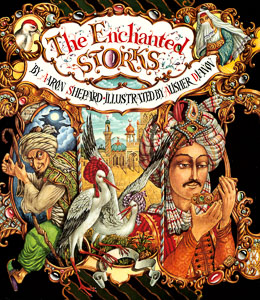Here is the author note from my picture book.—Aaron
This tale—usually called “The Calif Stork” or “The Stork Calif”—is often classified as a folktale of Iraq; and folklorist Harold Courlander, who heard it twice from Muslim storytellers, believes it to be widely told in the Middle East. Yet its origin is The Caravan, a book of original fairy tales by nineteenth-century German writer Wilhelm Hauff. While folktales often make their way into written literature, in this case a written work has passed into folklore. My own retelling draws from both original and retold versions.
The calif in this tale is patterned after Harun al‑Rashid, made popular in the pages of The Thousand and One Nights. In Harun’s time—around A.D. 800—the calif was both emperor and religious leader to an Islamic realm stretching from northwest India across southwest Asia, on through north Africa, and into Spain.
Bagdad, founded in A.D. 762, was the capital of this empire. Its political importance and its convenient geographical location on the Tigris River made it a prime commercial and trading center. Ships docked there from eastern Africa, India, and China, exchanging goods with caravans trading west to the Mediterranean. Artisans from many nations settled there to ply their trades.
The city also benefited from the amazingly rich soil of the Tigris-Euphrates river valley. An extensive system of artificial canals created a major agricultural region, much as has been created today in central California. Lumber too was available, especially from the thick oak forests of the nearby Zagros Mountains.
With its many assets, Bagdad became the richest city in the world. At the same time, the city became a leading intellectual and cultural center. Encouraged by the califs, great minds and talents emigrated there, representing many nations, religions, disciplines, and traditions. Ancient Greek manuscripts were imported, translated, and studied. Science, medicine, and literature rose to heights not equaled in Europe for many centuries. When the craft of papermaking arrived from China, handwritten books proliferated, and in one Bagdad bazaar district alone there were a hundred bookshops!
Sadly, the golden age of Bagdad lasted only about a century from its founding. As the Islamic empire fell apart, the city too was torn—by civil strife, marauders, corruption, rebellion, and finally invasion. In the 1800s, Bagdad regained a portion of its prosperity, and in the 1900s became the capital of oil‑rich Iraq—but has once more seen its riches drained and destroyed by armed struggle.
A vizier is a prime minister. Allah is the Arabic word for “God.”
